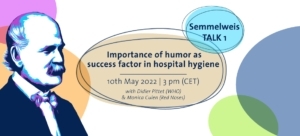The global COVID 19 pandemic has led to an unprecedented focus on hand hygiene. However, the new attention paid to it in all our everyday lives should not hide the fact that the topic of professional hand disinfection in hospitals in particular continues to require greater awareness: The Semmelweis foundation is alarmed that only a genuine rethink of hospital hygiene can prevent dangerous germs and their devastating consequences.
On the occasion of the International Hand Washing Day of the World Health Organization (WHO), which is of particular importance in this crisis-ridden year 2020, Semmelweis Foundation once again calls for political attention to be drawn to the fatal long-term problem of hospital germs: Nosocomial infections caused by dangerous hospital germs can be drastically reduced by thorough and consistent hand hygiene in our health care facilities. Under the motto “Clean hands – Save lives!”, the independent and non-profit organisation based in Vienna takes decision-makers from politics, business and health care alike to prioritise the safety and protection of healthcare professionals and patients.
Hand hygiene with alcoholic hand disinfection should be a matter of course in clinics, nursing and old people’s homes. Even today, however, there are still gaps in hygiene which, in the worst case, can have fatal consequences. Infections with antibiotic-resistant hospital germs are relatively easy to prevent through consistent and continuous hand hygiene of the clinic staff, but also of visitors.
Careless handling causes medical and economic problems
“The pathogens we are confronted with today are, from the present perspective, far more dangerous than the germs that were feared in Semmelweis’ time. They are also often caused by the wrong and too careless use of antibiotics. Such multiresistant germs do not necessarily have to be a problem in everyday life, but in health care facilities they can become a life-threatening factor for patients who are already weakened and therefore easily attacked,” explains Dr. Bernhard Küenburg, President of the foundation named after Dr. Ignaz Semmelweis.
Not only medically, but also economically, the best infection is the one that does not develop in the first place. In health and care facilities, complete hand disinfection is, in addition to the use of exclusively sterile or sterilised materials, the prerequisite for preventing infections. The problem: The knowledge and the tools are there, only time pressure, lack of personnel and sometimes forgetfulness and lack of insight of the people lead to the fact that the “five moments for alcoholic hand disinfection” established worldwide by the WHO are not observed – which are there:
- before the patient contact
- before aseptic activities on patients
- after contact with potentially infectious materials
- after patient contact and
- after contact with the immediate surroundings of the patient.
Semmelweis’ findings on antisepsis in hospitals are as up-to-date today as they were more than 170 years ago – more precisely: more up-to-date than ever. As early as 1847, Dr. Ignaz Semmelweis discovered the cause of childbed fever: “toxic substances” that are transferred from one person to another and developed an extremely effective strategy against what he called contact infection: hand disinfection. While thorough hand washing with soap usually provides sufficient protection in our everyday lives, alcoholic hand disinfection in hospitals is essential to protect lives!




